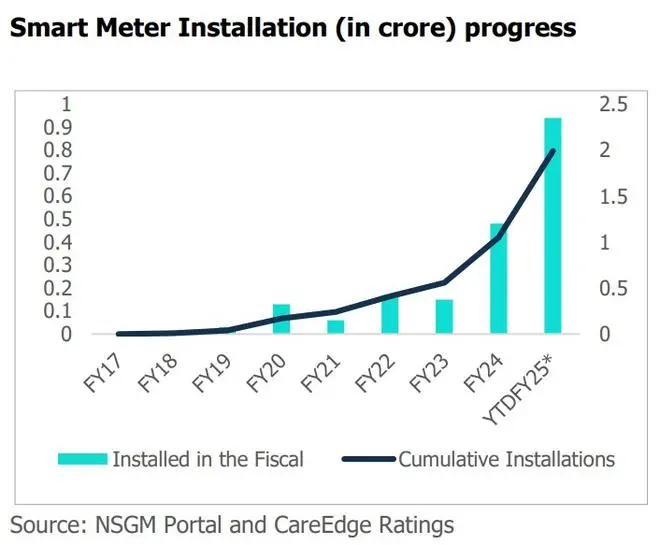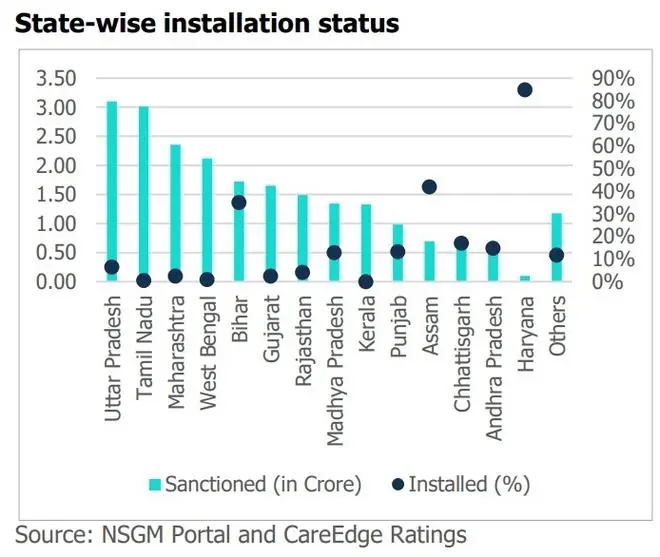
Bihar and Assam lead installations | Photo Credit: Kesavan A N 1612@Chennai
Even as the Central government pushes for faster smart meter installations under the Revamped Distribution Sector Scheme (RDSS), the programme requires a massive ₹1.25 lakh crore investment — comprising ₹95,000 crore in debt and a 25 per cent equity contribution, according to CareEdge Ratings.
“Power distribution companies could unlock an additional ₹4 lakh crore in revenue over seven years. If billing and collection efficiencies improve significantly, the financial gains could exceed initial estimates, strengthening the power sector’s stability,” the rating agency noted.
The smart meter installation programme has faced major delays nationwide, with only 1.36 crore meters installed out of the sanctioned 20.33 crore — just 6.7 per cent of the target. In response, authorities are implementing urgent measures to accelerate progress. CareEdge also notes that installations remain sluggish, reaching only 2 crore by January 2025.

Key delays stem from tendering challenges, consumer data validation, and regulatory approvals such as field testing and integration. Additionally, setting up direct debit payment systems has slowed progress, Union Minister of State for Power Shripad Naik informed the Lok Sabha on Thursday.
At the State level, execution lags despite awards being sanctioned. The top eight States account for 16.8 crore out of 22.2 crore sanctioned meters, with 78 per cent of the 13.8 crore awarded meters. Bihar and Assam lead installations, with Bihar alone contributing 60 lakh meters (30 per cent of India’s total) and completing 35 per cent of its sanctioned target.
Uttar Pradesh, a key focus due to high AT&C losses, has awarded all sanctioned meters but faces slow execution. Maharashtra has also awarded all its meters under RDSS. Notably, AT&C (Aggregate Technical and Commercial) loss recovery aligns with smart meter adoption, with Bihar showing the highest improvement between FY16 and FY23, CareEdge stated.
To accelerate installation, the government has introduced Standard Operating Procedures (SoPs), ensuring multiple recharge options, consumer feedback mechanisms, and efficient complaint resolution. States have also been advised to offer a 5 per cent rebate for pre-paid consumers.
Other key measures include regular progress reviews with State authorities, mandatory installation of check meters for up to 5 per cent of smart meters — particularly in cases of consumer complaints—and prioritising smart meter installation in government establishments, industrial hubs and high-load consumer areas. Additionally, smart meter feedback collection units are being set up to ensure transparency and efficiency.

Published on March 28, 2025

Comments
Comments have to be in English, and in full sentences. They cannot be abusive or personal. Please abide by our community guidelines for posting your comments.
We have migrated to a new commenting platform. If you are already a registered user of TheHindu Businessline and logged in, you may continue to engage with our articles. If you do not have an account please register and login to post comments. Users can access their older comments by logging into their accounts on Vuukle.